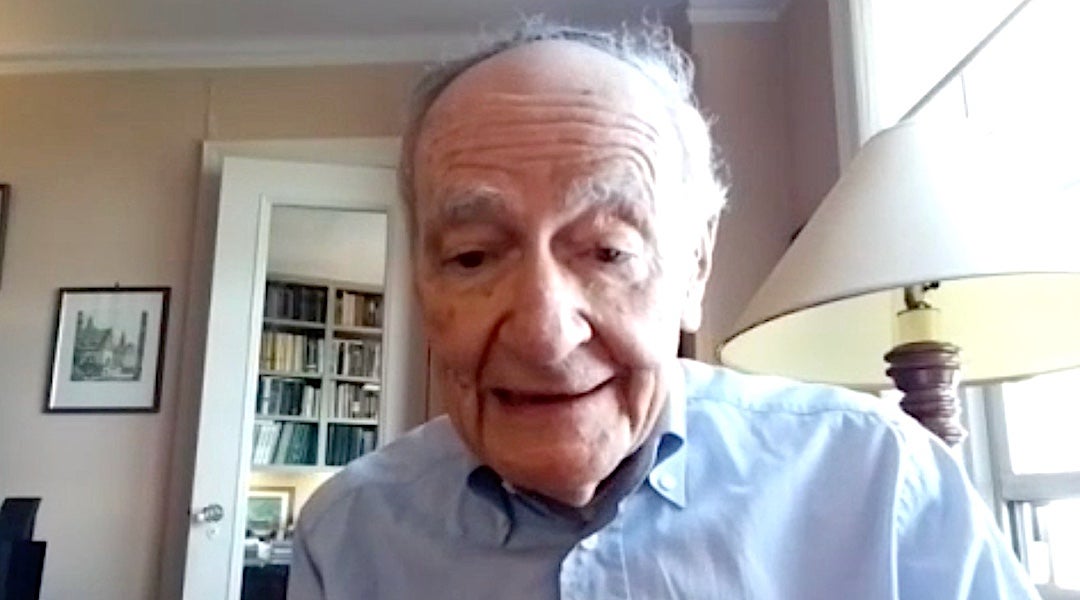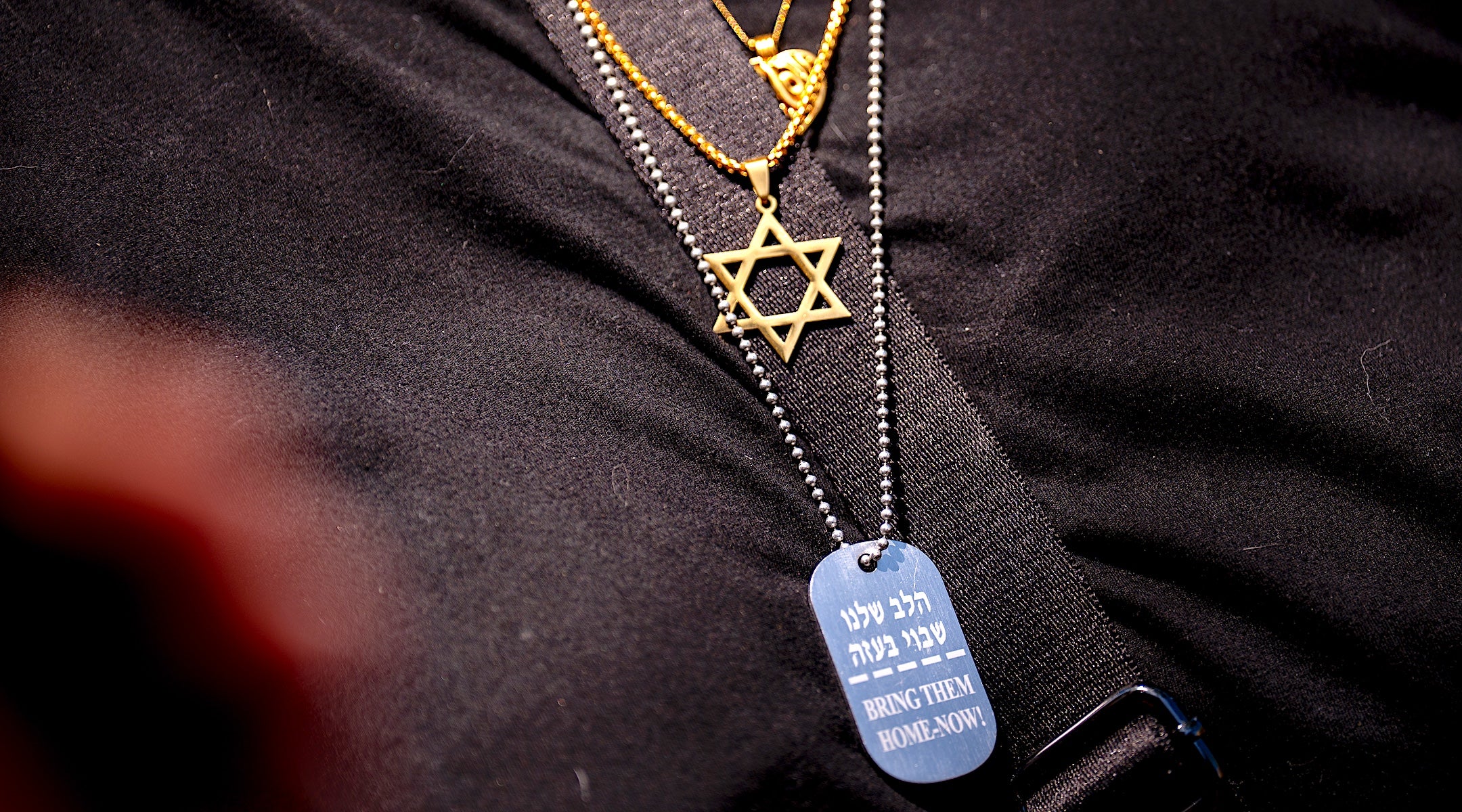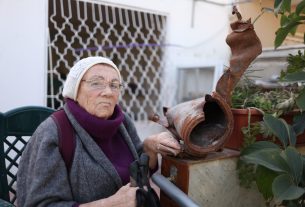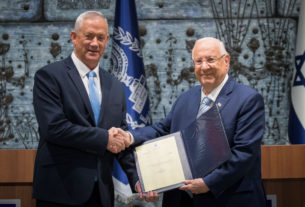In the two years since the attacks of Oct. 7, the Jewish discourse over the war in Gaza has been agonizing and polarizing. Jews have argued over the Israeli government’s military aims, over what it means to “bring the hostages home,” over the left’s betrayal of its Jewish allies and over the influence of Israel’s far-right ministers.
Since the summer, however, a number of Jewish religious and thought leaders are debating another assertion: that the war in Gaza is not just a military, ethical or diplomatic challenge, but a crisis of faith. They are warning that the death toll and humanitarian crisis in Gaza and the settler violence in the West Bank are shaking the beliefs and practices of engaged Jews.
“What we are facing today is a spiritual catastrophe, and what is at stake is not just the future of the state of Israel, but the very soul of the Jewish people,” Rabbi Sharon Brous, leader of the independent IKAR congregation in Los Angeles, said in a Rosh Hashanah sermon.
Most, but not all, of these spiritual critiques are coming from liberal Zionist thinkers and rabbis from the non-Orthodox denominations, not to mention pundits opposed to or disillusioned with Zionism. Critics of their stances, meanwhile, say the real spiritual hazard is that Jews abandon Israel and the hostages during a just war that Israel didn’t ask for.
But the latest discourse suggests that among many Jews in the mainstream, the second anniversary of the attacks is raising difficult questions about Israel, Judaism and Jewish identity.
In an interview in August, the journalist Peter Beinart asked Rabbi Ismar Schorsch how he would respond to a fellow Jew who might be dismayed over Israel’s actions in Gaza and the West Bank.
“What would you say to someone,” Beinart continued, “whose very belief in God and whose belief in Judaism had been brought into question by what Israel is doing in Gaza and the West Bank?”
Schorsch, 89, the chancellor emeritus of the Jewish Theological Seminary, accepted the premise of Beinart’s question, replying:
I think that in some ways, Judaism is at [a] critical moment. Are we going to be able to defend Judaism, which has the burden of the chillul Hashem [desecration of God’s name], taking place on the West Bank and on Gaza? Will we be able to live [with] that Judaism, and if we don’t speak out now, it may be too late. This may be our final moment. In raising the ethical constraints that need to be imposed on the Israeli government, we are defending Judaism, and Judaism is going to have to survive this catastrophe. And how will we be able to live with ourselves if we were silent?
The response was surprising, perhaps, coming from a historian who from 1986 until his retirement in 2006 as head of Conservative Judaism’s flagship was not known for either fiery rhetoric or public criticism of Israel. In some rabbis’ forums, there was dismay that Schorsch had aired his views in conversation with Beinart, an observant Jew whose very public drift from Zionism has been the subject of debate and much ridicule.
But Schorsch had aired similar misgivings about the spiritual toll of the war over the summer, in an essay for the fast day of Tisha B’Av. “The unremitting violence against helpless Palestinians in Gaza and their wholly innocent coreligionists on the West Bank will saddle Jews with a repulsive religion riddled with hypocrisy and contradictions,” Schorsch warned. “The messianism driving the current government of Israel is sadly out of kilter with traditional Judaism — and an utter moral abomination.”
In her sermon, Brous describes Hamas as a “formidable foe who has repeatedly expressed its intent to repeat the massacres of the 7th of October again and again and again.” And yet she excoriates Israeli Prime Minister Benjamin Netanyahu for “the perpetuation of a war now nakedly advanced to keep in power a craven prime minister,” and government ministers who “openly share their feverish anticipation of a full resettlement of Gaza at all costs.”
Beyond what could be read as a partisan political sermon from a well-known liberal Zionist, Brous also speaks of the spiritual costs of what she calls “manifest disregard for Palestinian lives.”
“To be clear, core to our Jewish faith is the notion that every human being is created in God’s own image, which means that the death of any innocent is a moral catastrophe. A moral catastrophe,” she said. “And yet the devastation continues to rain down on Gaza. And I must wonder, have those leaders completely divorced themselves from Jewish history, from our Jewish tradition?”
“What we are facing today is a spiritual catastrophe,” Rabbi Sharon Brous, leader of the independent IKAR congregation in Los Angeles, said in a Rosh Hashanah sermon on Sept. 23, 2025. (Screenshot via YouTube)
Brous quotes the Israeli historian Yuval Noah Harari, who in August called the war “a spiritual catastrophe for Judaism itself.”
“What is happening right now in Israel could basically, I think, destroy 2,000 years of Jewish thinking and culture,” Harari said on “The Unholy “ podcast. Driving his grim prediction for Judaism’s future, he said, were “an ethnic cleansing campaign in Gaza and the West Bank,” the “disintegration of Israeli democracy” and the creation of a new Israel which is based on “an ideology of Jewish supremacy and the worship of what were completely anti-Jewish values for the last two millenia.”
It’s not just liberal Zionists like Brous and Schorsch and critics of Zionism like Beinart — whose latest book is titled, “Being Jewish After the Destruction of Gaza: A Reckoning” — who are talking about the war’s impact on Judaism.
In August, 80 mostly Modern Orthodox rabbis, representing a staunchly Zionist cohort, signed a letter calling for “moral clarity” in response to the hunger crisis in Gaza. The letter expressed their critique in terms of Jewish texts calling for “justice and compassion.”
“They are the foundations of our ethical obligation — to demand policies that uphold human dignity, to provide humanitarian aid wherever possible, and to speak out when our government’s actions contradict the Torah’s moral imperatives, no matter how painful this may be to accept,” according to the letter.
The letter’s author, Rabbi Yosef Blau, told (JEWISH REVIEW) that he wrote the letter in part to defend Judaism and its Orthodox practitioners from the consequences of policies that he called antithetical to tradition. Blau, a former spiritual adviser at Yeshiva University, said the letter was intended in part for the secular Israeli Jew who might say, “I don’t see a Judaism that stands for moral values that I can identify with.”
For some critics — and Blau and his colleagues had plenty, within Orthodoxy and beyond — public moralizing about the war is dangerous because it gives rhetorical ammunition to Israel’s enemies. They also accuse those who call the war a spiritual crisis of cherry-picking Judaism: In addition to its calls for justice and compassion, they say, Jewish tradition justifies war in the name of self-defense and in securing the land of Israel against its enemies.
They also point to some polling and anecdotal evidence showing that the trauma and stress of war inspired many Jews to intensify their engagement with Judaism.
“Their sermons are not courageous; they are capitulating,” the author and rabbi Shmuley Boteach wrote in an angry response to the rabbis’ letter. “Their statements are not moral; they are derelictions of duty.”
Jews on college campuses and those attending synagogues, Boteach continued, “need spiritual leaders who roar with pride. Rabbis who declare that Israel is our shield, our heart, our destiny. Rabbis who teach that Israel’s war is not only just but holy — a fight for the survival of the Jewish people against the forces of annihilation.”
Jonathan S. Tobin, editor-in-chief of JNS.org, similarly urged rabbis and pundits to resist the impulse to “virtue-signal their ambivalence about a war against a truly evil opponent,” and instead “join in solidarity with Israel’s efforts to extinguish Hamas.”
“Inevitably, many of the resulting reflections often have more to do with political opinions than dispassionate moral judgments,” wrote Tobin. “And that can be particularly egregious when applied to the efforts of those who serve its cause in the middle of an armed conflict with the genocidal Islamist forces that head the Palestinian national movement.”

“For us to defend what is happening on the West Bank and in Gaza religiously is simply hypocritical,” Rabbi Ismar Sschorsch said in an interview, above, with the journalist Peter Beinart. (Screenshot via Substack)
Tobin was responding to a column by Yossi Klein Halevi, a senior fellow at the Shalom Hartman Institute. An American-born Israeli who leans center-right, Klein Halevi had written in advance of the High Holidays that Israel and its supporters should undergo a process of “moral self-critique” in keeping with the holidays’ themes of introspection and repentance — within limits.
“Even when fighting an existential war against enemies without moral restraint, there are limits to what is morally permitted to the Jewish state,” wrote Halevi in the Times of Israel. “And given the nature of our enemy and the threats against us, there are limits to the self-recrimination Jews should assume.”
Nevertheless, he writes, “something has gone very wrong in Gaza,” citing the humanitarian crisis, the high civilian death toll, the messianic intentions of Netanyahu’s cabinet and, beyond the war itself, the settler rampages on the West Bank. Writes Halevi:
This season of self-reckoning that begins with the Hebrew month of Elul and culminates on Yom Kippur is intended not only for individual Jews but also — in fact primarily —for the Jewish collective. Undergoing this process as a people doesn’t weaken us. It provides spiritual protection.
Just as we need a language for defending ourselves against the lies and distortions, we need a parallel language in which we struggle with the moral dilemmas raised by this war. Those of us who love Israel must not forfeit the moral conversation to Jews who have despaired of Israel or who openly side with our enemies.
An observant Jew and journalist who has covered both sides of the Israeli-Palestinian conflict, Halevi is comfortable using the language of Jewish tradition in discussing politics and policy.
Pulpit rabbis are typically more hesitant. Unlike retired university administrators like Blau and Schorsch, they face congregants who may, and do, revolt over a sermon they don’t agree with. In her sermon at New York’s Central Synagogue on the first day of Rosh Hashanah, Rabbi Angela Buchdahl told her congregants, “I have never been so afraid to talk about Israel.”
Buchdahl, one of the country’s best-known pulpit rabbis, went on to discuss the spiritual hazards of the war, but was careful to describe defects among both Israel’s critics and its defenders. She framed her talk around the Torah portion read on the first day of Rosh Hashanah, which is about the conflict between Abraham’s wife Sarah and her handmaid Hagar. Judaism’s ancestors chose to have the story read on Rosh Hashanah when, she said, “our tradition asks us to take a cheshbon hanefesh, an accounting of our souls.”
The story is about empathy, which has been lacking on both sides, said Buchdahl. Israel’s critics refuse to acknowledge the vulnerability Israelis feel after Oct. 7 and “take the worst accusations against Israel at face value,” while the defenders have become callous toward the children in Gaza “who are suffering, exiled, and desperate.”
“This war has tested our empathy. All of us,” she said. “I see the ways that my fear has disabled my empathy response. I still struggle to find the emotional bandwidth to read the tragic stories coming out of Gaza while my extended family is still held captive, while calls to ‘blacklist Zionists’ or to ‘globalize the intifada’ still ring around the world, and even this city.
“But who do we become when we harden our hearts?”
Jay Michaelson, a rabbi and contributing columnist at the Forward, suggests the discussion over how the war might change Judaism is the latest expression of an age-old tension between universalism and particularism. Liberal Jews, he writes, tend to favor the universal aspects of tradition that cultivate “compassion for everyone, not only Jews or even primarily Jews.” Israel’s right-wing government, and the observant Jews who support it, represent a “hyper-particularist” strain for whom “Judaism is about the love of other Jews, first and foremost.”
Michaelson rejects this particularism in favor of a Jewish path “committed to human rights, justice, love and universalism.” In some ways, he writes, he practices “a different religion, a different way of life, from at least half the religious Jews in the world,” and appears reconciled to that division.
Schorsch, meanwhile, thinks the moral stakes demand rebuke. He directs his remarks at fellow clergy, calling it their responsibility to denounce the “excesses” being carried out by Israel and being condoned by right-wing rabbis.
In his interview with Beinart, Schorsch sympathized with rabbis who do not feel comfortable using their pulpits to question Israel, but said they should do it anyway in the spirit of the self-correcting tradition of the Jewish prophets — and for the sake of Judaism itself.
“The prophets were the critical spokesmen that limited the authority of the monarchy, and the voice of the prophets is silent today,” he said. “There is nothing more destructive of religion than hypocrisy and for us to defend what is happening on the West Bank and in Gaza religiously is simply hypocritical, and I think will be a burden for the future history of Judaism.”
Keep Jewish Stories in Focus.
(JEWISH REVIEW) has documented Jewish history in real-time for over a century. Keep our journalism strong by joining us in supporting independent, award-winning reporting.

is editor at large of the New York Jewish Week and managing editor for Ideas for the Jewish Telegraphic Agency.
The views and opinions expressed in this article are those of the author and do not necessarily reflect the views of (JEWISH REVIEW) or its parent company, 70 Faces Media.




